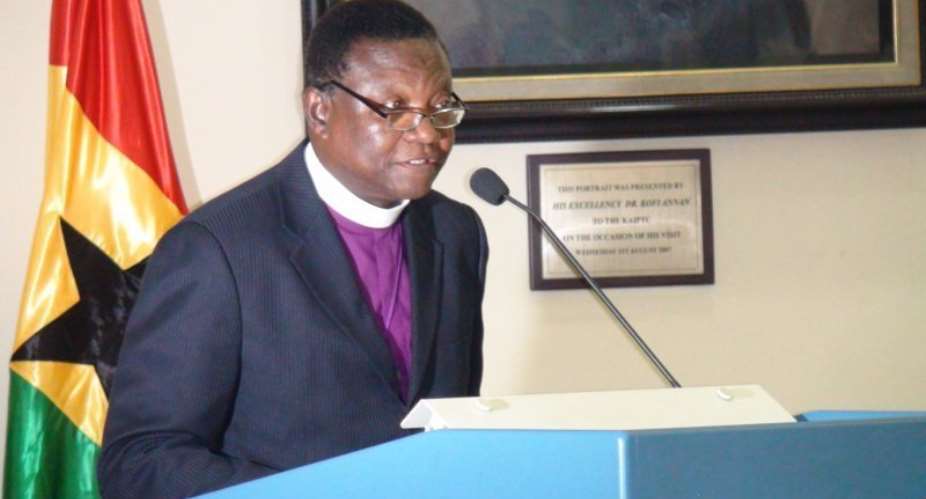Various speakers at a media sensitization forum in Kumasi have pointed out unprofessional conduct of some journalists in the country as one of the main challenges to deal with in the nation’s quest for lasting peace.
According to them, news reporters, editors as well as media owners have crucial roles to play before, during and after every general election to enhance the ‘beacon of peace’ accolade the nation has.
Chairman of the National Peace Council, Most Reverend Prof. Emmanuel Asante who was one of the speakers was sad about the harm being caused by people he described as ‘gutter press and Cheque book journalists’.
He was of the view that the ‘gutter press and cheque book journalists’ whose mastery is in sensationalism, lies, political invectives, and insults to create chaos demeaned the important roles of journalists and do not qualify to called as such.
The sensitization forum was aimed at strengthening the partnership between the media and the Multi-Stakeholder platform on peace and governance in Ghana.
The Multi-Stakeholder platform includes the United Nations Development Program (UNDP), Ghana Center for Democratic Development (CDD-Ghana) and West Africa Network for Peace-building (WANEP) as well as the National Peace Council.
The platform seeks to build consensus and strengthen partnerships with civil society organisations, media, government and the private sector towards developing pragmatic and workable interventions solutions to the critical challenges in order to promote peace and good governance in Ghana.
The support and partnership of news editors invited to the forum was solicited for the peace campaign before, during and after the 2020 general elections.
Most Rev. Prof Asante urged the media houses to keep building the capacity of media professionals in diverse disciplines that gear towards development discourses to enhance their correct shaping of the public view on developmental issues.
A representative of UNDP Melody Azinim noted that peace is an essential component, necessary for the attainment of the SDGs. This, according to her is because of its inextricable nexus with development, a reason for SDG 16 which commits countries to “promote peaceful and inclusive societies for sustainable development, provide access to justice for all and build effective, accountable and inclusive institutions at all levels.”
She said ‘though Ghana is regarded as a beacon of peace in the Sub-Region, we are all however, aware of the challenges we face such as pockets of land and chieftaincy conflicts and in recent times the rising cases of political vigilantism which have the potential of scuttling the country’s democratic and developmental gains’.
Mrs. Azinim notes that Since conflicts are not spontaneous, it is imperative that the signs and indicators that precede them are identified and managed timeously.
A research analyst at CDD Ghana, Mr. Mawusi Dumenu also noted that the negative governance and democratic traits including increasing political polarization and politicization of national issues require stakeholders’ attention in a concerted and coordinated manner to actively engage and contribute to national policy responses to the systemic governance challenges, and to proffer sustainable alternative solutions as necessary.
The Ashanti regional chairman of the Ghana Journalist Association Kingsley Hope said the signs of upcoming chaos were clearly showing for all to see hence the collaboration of the Multi-Stakeholder platform with the media was timely.
Reading a speech on behalf of the GJA President Mr. Affail Monney, he assured the platform that GJA’s will work assiduously with all media houses to work on bringing a solution to political vigilantism in Ghana.





 We’ll no longer tolerate your empty, unwarranted attacks – TUC blasts Prof Adei
We’ll no longer tolerate your empty, unwarranted attacks – TUC blasts Prof Adei
 Bawumia donates GHc200,000 to support Madina fire victims
Bawumia donates GHc200,000 to support Madina fire victims
 IMF to disburse US$360million third tranche to Ghana without creditors MoU
IMF to disburse US$360million third tranche to Ghana without creditors MoU
 Truck owner share insights into train collision incident
Truck owner share insights into train collision incident
 Paramount chief of Bassare Traditional Area passes on
Paramount chief of Bassare Traditional Area passes on
 Two teachers in court over alleged illegal possession of BECE papers
Two teachers in court over alleged illegal possession of BECE papers
 Sunyani: Victim allegedly shot by traditional warriors appeals for justice
Sunyani: Victim allegedly shot by traditional warriors appeals for justice
 Mahama vows to scrap teacher licensure exams, review Free SHS policy
Mahama vows to scrap teacher licensure exams, review Free SHS policy
 Government will replace burnt Madina shops with a new three-story, 120-store fac...
Government will replace burnt Madina shops with a new three-story, 120-store fac...
